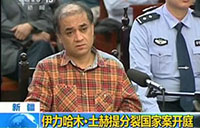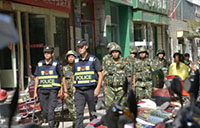 |
| Uygur scholar sentenced to life in prison for secession |
 |
| Heavy casualties reported in Xinjiang terror attack?? |
BEIJING - The far-fetched analogy between a newly convicted Uygur teacher and Nelson Mandela displays not only a dangerous ignorance of history, but also a challenge to China's determination to keep its 56 ethnic groups united.
The irritating comparison was made by some entrenched critics of China's ethnic policy immediately after a Chinese court sentenced Ilham Tohti to life imprisonment for separatism on Tuesday.
It was not the first time that these biased critics have honored China's criminals as human rights fighters.
By calling a separatist who incited ethnic hatred "the Chinese counterpart" of the South African anti-colonial hero, they demonstrated their deep-rooted belief that China has colonized Xinjiang, which has been an integral part of the country since ancient times.
Although no Western countries publicly claim that the northwestern Chinese autonomous region should be independent, some have been encouraging separatist activities in and out of the Chinese territory, which covers one-sixth of the nation's total landmass.
Questioning China's trial of Ilham Tohti and idolizing the scholar-turned-criminal are just the latest examples.
In fact, calling Ilham Tohti the "Chinese Mandela" is blasphemy against the Mandela spirit.
What made Mandela well known was his iron will against South Africa's outdated apartheid. Ilham Tohti, on the contrary, has been convicted of behaviors that create distrust and estrangement between Uygurs and other ethnic groups.
Police investigation has found that the economics professor used his website to encourage his fellow Uygurs to use violence.
While Mandela preached reconciliation, Ilham Tohti preaches hatred and killing.
Ilham Tohti's deeds contradict his words. The man is fond of calling himself "a pure scholar" who wants to serve as a bridge between ethnic groups and does not want to be politicized.
But evidence has shown that Ilham Tohti colluded with foreign groups and individuals in hyping Xinjiang-related incidents with the aim of making domestic issues international.
Western countries, which have frowned upon the Chinese court's latest sentence, are using Ilham Tohti as their pawn to pile political pressure on China, a country that has suffered from a spate of terrorist attacks in its train terminals and residential communities over the past year.
For them, anyone, even those like Ilham Tohti who turn to extremism, could be named a freedom fighter as long as he is against the Chinese government.
Their accusations against the court's ruling came as the warplanes of the United States and its allies bomb the "Islamic State" militants in their anti-terrorism war.
China's painstaking efforts to eradicate the three evil forces of terrorism, separatism and religious extremism in Xinjiang should have been viewed as part of the world's anti-terrorism endeavors. Ilham Tohti should have been denounced as a criminal threatening the peace and stability of a country.
It is only because of Western countries' double-standards on terrorism that a criminal was hailed as a hero.
